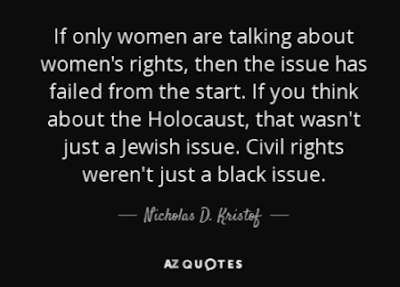It was great to see so much activity worldwide during the recent International Women’s Day; the creativity and imagination behind so many events has been inspiring.
A favourite of mine was this two minute clip where high school boys asked their mothers, sisters and other women they love about why they need feminism. Their responses are striking – all the more so when heard from male voices, and all the more so when the final appeal is one that transcends gender: “feminism is important to the women in our lives, so it should be important to us too “. This puts feminism firmly in the realm of commitment to others – something which is not, at root, solely about gender per se, but about being a decent human being.
Another story of what happened when a man and woman switched names in their email signatures at work for a week was also fascinating. The differing responses to the same information, when the only difference is the gender implied by a name at the bottom of an email shows beyond any reasonable doubt that there is still a long way to go to remove deeply-held paradigms of gender inequality. That’s not so say that we have not already come a long, long way – and with even a then-President of the USA writing explicitly and at length why he is a feminist there is no shortage of role models. But there is still much to be done.

|
| World Women’s Day raises interesting questions about who should and how to support feminism |
Stepping back from these examples, perhaps there’s a problem here. I have written about the boys’ video, the man’s story and Obama, used a quote from a man – and indeed, above I just wrote “all the more so when heard from male voices”. But why do we need men to be speaking for women? Isn’t that part of the problem? I think, honestly, that it is problematic. We are working toward a world where men’s voices are no more persuasive than women’s, but it’s clear that we have some way to go. It rather troubles me that I found these three cases so compelling. Is it a coincidence that they all involve men? Hard to say. I guess were this movement being supported only by men then I think there might be a legitimate cause for concern over patriarchy, but in a massive coalition that transcends all divisions, this does not seem to me to be such a concern. And perhaps it is precisely because some men (and even women) will only listen when truths are spoken by other men, that we need strong male voices in the conversation to be role models. Perhaps it was the relative scarcity of the male voices that made them stand out to me.
So, speaking out is the right thing to do, regardless of gender. Sweden is actually making this official education policy – with every Swedish 16-year-old to receive a copy of We Should All Be Feminists. On my part, I am delighted to see anyone supporting feminism; any alternative makes no sense to me. That has to mean that we should be delighted to see men speaking out for feminism; just as we are to see straights speaking out against homophobia; whites speaking out against racism; non-jews speaking out against anti-semitism, and so on. For now, from where we currently are, I suggest that who is talking is of secondary importance; it just matters that it is said, that it is heard, and that it makes a difference.


